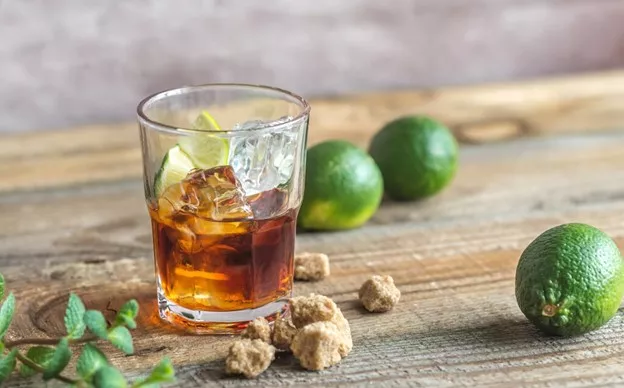Rum is a diverse spirit, with regional differences that extend beyond the simplistic binary of ‘white’ and ‘dark’. Light-bodied, Spanish-style rums from countries like Puerto Rico and Cuba are clean and crisp, making them perfect for mixing in cocktails. On the other hand, English-style rums from former British colonies such as Jamaica and Barbados have a fuller body and robust flavor profile, often enjoyed neat or on the rocks. French-style ‘rhum agricole’, primarily from Martinique, is distilled from fresh sugarcane juice rather than molasses, leading to a grassier, more vegetal flavor.
For the discerning rum aficionado, WhiskeyD’s online store offers a carefully curated selection of rums, sourced from a plethora of distilleries across the globe. Whether you prefer the smooth and sweet Spanish style, the rich and fruity English style, or the unique and vegetal French agricole, you’re sure to find a bottle that fits your taste.
The Sweet Science of Sugarcane and Terroir
Sugarcane is the heart of rum. The variety of sugarcane, the soil it’s grown in, and the climate it’s exposed to profoundly affect the spirit’s flavor profile. The concept of ‘terroir’, borrowed from the world of wine, is equally relevant here. The rich, volcanic soils of Martinique, for example, yield cane with a high sugar content, resulting in rhums agricole with an intensely fruity character. On the other hand, Barbados, with its coral limestone soils, produces cane that contributes to rums with a delicate, refined flavor profile.
Deciphering Terroir and Sugarcane in the World of Rum
The subtleties of terroir and sugarcane varieties might seem overwhelming at first, but understanding these factors can significantly enrich your rum-tasting experience. Here is a simple guide to help you navigate these complex aspects:
- Understand Sugarcane Varieties: Sugarcane varieties greatly influence the character of the final spirit. For example, the ‘Blue Cane’ used in Louisiana rums is renowned for its high sugar content and distinct sweetness, while the ‘Creole Cane’ used in Martinique lends a fresh, grassy note to the rhum agricole.
- Acknowledge the Impact of Soil: The soil in which the cane is grown, its mineral composition, drainage, and pH, all contribute to the character of the sugarcane, and therefore, the rum. Volcanic soils, for instance, yield sugarcanes with more mineral and fruit-forward flavors, as evidenced by rums from Martinique and Guadeloupe.
- Factor in Climate: The climate – temperature, rainfall, sunshine – all affect the growth of the cane and, by extension, the rum’s character. Hot, humid climates speed up maturation, intensifying flavors, while cooler climates result in a slower, more nuanced maturation process.
- Appreciate Harvesting Techniques: The time and method of harvesting sugarcane also influence the final product. Some distilleries prefer to harvest cane at its peak sugar content, while others might choose a slightly earlier or later harvest to attain certain flavor profiles.
- Grasp the Concept of ‘Agricole’: Rhum agricole, made from fresh sugarcane juice rather than molasses, exhibits a stronger ‘terroir effect’. The freshness of the cane, coupled with regional factors, results in a spirit that truly reflects its geographical origin.
Understanding the world of rum goes beyond merely sipping on a glass. It’s about appreciating the intricate dance between nature and craftsmanship that brings this fascinating spirit to life. With each bottle, you don’t just taste rum; you experience a place, a climate, a terroir. And that’s the beauty of delving into the spirit of sugarcane – rum.
Pioneers of Sustainability in the Rum World
The rum industry is not without its environmental challenges, but several distilleries are leading the charge in sustainability. One such pioneer is the Rhum Clement distillery in Martinique, which uses spent sugarcane fiber (bagasse) to generate energy for its operations. Another notable example is Appleton Estate in Jamaica, which treats and recycles wastewater for irrigation, reducing water usage and pollution.
Again, these sustainable distilleries and many more are proudly represented at WhiskeyD’s online store, underscoring their commitment to supporting producers who respect and preserve the environment.
Rum – The Soul of Classic Cocktails
Rum has been the backbone of the cocktail world since its inception. From the refreshing Mojito and the tropical Piña Colada to the sophisticated Hemingway Daiquiri and the fiery Dark ‘n’ Stormy, rum’s versatility shines. Each of these cocktails harnesses a different facet of rum’s character, from the light and crisp Spanish-style rum in a classic Mojito to the dark, rich English-style rum in a potent Dark ‘n’ Stormy.
It is crucial to tread with curiosity, respect, and a thirst for knowledge. This exceptional spirit, with its rich history and diverse expressions, offers a captivating world that goes far beyond its Caribbean origins and fruity cocktail associations.
By understanding the fundamental role of sugarcane, appreciating the influence of terroir, and celebrating sustainable practices, we begin to truly value the complexities of this versatile spirit. These insights encourage us to discern the intricate layers of each rum expression, from the robust, molasses-based rums of Jamaica to the delicate, cane-juice rums of Martinique.
However, as we deepen our understanding and build our rum collection, let’s be mindful of the culture and traditions that have shaped this spirit. Just as every sip reveals a unique story, it’s essential to remember that these stories are deeply entwined with communities and their livelihoods.
Seek out and support distilleries that prioritize fair trade and sustainable practices, ensuring the continued flourishing of this magnificent spirit. After all, savoring rum is not just about relishing its flavors but also contributing to its thriving, sustainable future.

